boom and bust in Ireland
advertisement
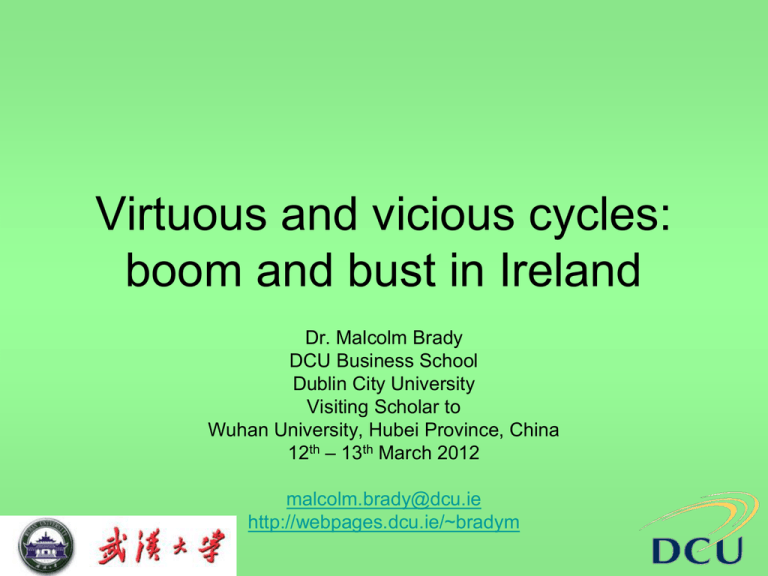
Virtuous and vicious cycles: boom and bust in Ireland Dr. Malcolm Brady DCU Business School Dublin City University Visiting Scholar to Wuhan University, Hubei Province, China 12th – 13th March 2012 malcolm.brady@dcu.ie http://webpages.dcu.ie/~bradym Ireland before the 1990’s… • • • • A sleepy backwater Long legacy of emigration Poor infrastructure Small industrial base – drinks, clothing, agriculture (beef, foodstuffs) • Strong rural links/ Church influence • Buying votes, but high taxes and interest rates • ‘living away beyond our means’, fiscal rectitude but had resource advantages… • • • • • • Young, educated, low-cost workforce Only English speaking Euro-zone country Easy access to European markets Good educational system Pro-business government policies Agencies active in seeking investment – Especially in knowledge-based industry • Low corporation tax at 12.5% that attracted in investment… • Technology firms – Intel, Dell… • Pharmaceutical – Pfizer, Wyeth… • Financial services firms – Insurance, re-insurance… • Software… – Microsoft… which led to amazing growth… • Initially due to higher productivity – People worked harder, smarter and longer – Higher skill work • Financial services/ software/ hi-tech manufacturing • Second phase due to building boom – Houses/ apartments/ shopping centres – Dublin, then hinterland, then entire country – Not well-planned or integrated – Schools/ shops lag housing – Transport difficulties in outer suburbs, dormitory towns – Funded by borrowing Population - Republic of Ireland 4,500,000 4,000,000 3,500,000 3,000,000 2,500,000 2,000,000 1,500,000 1,000,000 500,000 0 1950 Employment - Republic of Ireland 2,500.00 2,000.00 1,500.00 1,000.00 500.00 0.00 1960 1970 1980 1990 2000 2010 House Completions - Republic of Ireland 2002 2004 2006 50,000 45,000 40,000 35,000 30,000 25,000 20,000 15,000 10,000 5,000 0 100,000 80,000 60,000 40,000 20,000 2003 2004 2005 2006 2007 2008 0 1990 2000 1995 2000 2005 2010 Source: CSO Ireland 2008 2010 GDP - per capita GNP - per capita increasing confidence, arrogance… • First population growth since Great Famine • Net immigration/ heterogeneous society • Cultural impact on world – Riverdance/ U2 • Diaspora buying up European property • But politicians ignoring people • No to Lisbon treaty – Annoyed European colleagues and corruption… • • • • Tribunals of inquiry estimated cost €434m Mostly in fees to the legal profession Ongoing - Two took 12 years, one 7 years Ignominious end to a number of political careers • Little outcome to date except national loss of innocence Society changed… • Pluri-cultural and pluri-lingual – Many non-Irish immigrants – New religions and customs • New infrastructure – M50 ring motorway around Dublin – Significantly upgraded roads to the capital • Thriving urban entertainment culture • Conspicuous consumption – Temple Bar and Grafton Street but growth caused strain… • Infrastructure inadequate – Long commutes – Traffic congestion • Health care system ‘third world’ • Large class size in primary schools • Services price inflation – Professionals/ craftsmen – Restaurants/ coffee shops/ bars/ hotels • Increasingly stressful lifestyles – ‘Breakfast roll man’/ ‘Yummy mummy’ and more serious problems… • Cost of living 20% above European average – Siptu, 2009 • Labour cost increase • Beginning to lose national competitive advantage • Senior private/public salaries dramatic increase • Widening gap between haves and have-nots • Binge drinking - young/ cocaine - middle class • Development of hedonistic culture • Drug-related gangland wars • Development of urban underclass and house price inflation… • Average house price increased from €87,000 in 1996 to €300,000 in 2006 (CSO 2008:22) • Banks – relaxed mortgage requirements – from 3 x salary to 8 x salary – from 20 years to 25/ 30 years – 100% mortgages available • Two incomes, plus parents • Many sectors benefit from high prices – Developers, builders – windfall profits – Government – stamp duty – Estate agents, lawyers - fee % of price Then worldwide shock… • Ireland is a small open economy – Susceptible to benefit/ suffer from worldwide changes • Interest rate increases – Increased cost of mortgages • Credit crunch • Recession in main trading partners UK/US banks got into trouble… • Bank of Ireland predicts €6b losses on property loans over next three years • Government provides €3.5b to BoI & AIB • demanding cap on executive earnings • Anglo Irish Bank nationalised, scandals • €7b customer deposit - switched with another bank • CEO’s loans hidden from auditors • €451m Golden Circle customers/ shareholders Source: Irish Times 12 Feb 2009 and bankers respond… • BoI’s Goggin admits mistakes made, but • declined to apologise • “And I suppose that if I have a regret, my regret is that I didn’t see this coming and perhaps the lessons of economics were forgotten. Economics ultimately are cyclical • …Irish people in general, rather than just the banks, “all got carried away on the euphoria” of that prosperity” • AIB’s Sheehy less conciliatory • “bank remuneration…got out of control to some degree where there was too much reward for short-term gain.” “That clearly has to be changed, not only in Ireland but everywhere. . .remuneration has to be linked to long-term risk and risk taking” flagship companies in trouble… • Waterford Wedgwood in receivership • Independent Newspapers share price tumbles • Ryanair letting go 200 staff in Dublin – Monthly airport passenger numbers down 9% – ‘Idiotic’ departure tax • “This Government must realise you can only promote tourism by welcoming visitors, not taxing them” - Michael O’Leary CEO Ryanair Source: Irish Times, 12th Feb 2009 A changed economy… • • • • • Credit crisis and bailout of the banks Consumer spending halted 266k houses vacant (15% of stock 2006 census, cso) Job losses - unemployment rises to 9% Jan 2009 Government revenue down 6.3% in 2008 • €20b budget deficit • Cutbacks across entire public sector – Budget levy/ Pension levy (viewed as paycut) – Benefits reductions/ Remedial teaching… • Increased taxes: departure tax/ income tax? and frightening bust… • Retail sales for 2008 down 4.5% • January deflation first for 50 years • Inflation forecast at -3% for 2009 • Mortgages, retail prices down • Wages and prices must drop 20% to restore competitiveness (Bloxham economist) • Contraction in economy of 6% forecast for 2009 • Living standards to drop 10% over next years • ‘It’s a battle for financial survival. We have to keep working at it’ • Brian Lenihan, Finance Minister Sources: Irish Times 12/13/25 Feb 2009 RTE 17 Feb 2009 Average New House Price - Ireland Consumer Price Index - Republic of Ireland 120 115 110 105 100 95 2000 2002 2004 2006 2008 Source: CSO Ireland Source:http://www.globalpropertyguide.com/ real-estate-house-prices/I Permanent TSB/ ESRI ISEQ Total Return Equity Indices 2008 Bank of Ireland Share Price 20 5 0 9/1/2002 1/14/200 5/28/200 10/10/20 2/22/200 7/6/2009 4 5 06 8 Source: Yahoo Finance 07 29 /2 /2 00 8 30 /4 /2 00 8 30 /6 /2 00 8 31 /8 /2 00 8 31 /1 0/ 20 08 31 /1 2/ 20 08 10 31 /1 2/ 20 15 14000 12000 10000 8000 6000 4000 2000 0 Source: Irish Stock Exchange Annual Statistical Review 2008 hostile public reaction… • Breakup of the Partnership Agreement – Between government, employers and unions – Street protests by unions, students, Gardaí – Strikes by transport and public sector workers • Senior bankers stepping down » remuneration checked (AIB CEO 60% pay cut) • Government debt rating under threat – bank guarantee scheme may backfire • EU reaction – Ireland’s policymakers failed to maintain ‘prudent fiscal course’ during the boom – Government recovery plan: ‘lack of clarity’ – Trichet optimistic, but hard decisions to be made followed by collapse… • • • • • Government bonds failed in capital market Ireland downgraded by rating agencies Bailout in November 2011 by EU/IMF/ECB Leading to huge debt and tax burden EU seen to protect European banks at expense of Irish taxpayer • Much emigration of young people to Australia, Canada, Britain and slow recovery… • Investment by social media companies – Google, Facebook, Paypal, eBay • Small but positive growth in the economy • Agricultural products sector growing • Exports growing – Software, pharmaceuticals, IT products, financial services A retrospective view… • Small economy • An absolute amount of investment provides big relative boost • downturn hurts disproportionately • Small society • Senior decision makers know each other – executives, bankers, developers, politicians, civil servants… • Fear that ‘Golden Circle’ still exists • Many senior bankers and developers remain • Public sector being scape-goated • But, except for senior staff, gained little during boom • Poor government blamed • FF satisfaction rating at historic low and its vote collapsed and some theory… • Compound/ exponential growth cannot continue indefinitely • Virtuous and vicious cycles spring from the same underlying system – Reinforcing feedback loops can lead to increase/ decrease – Change in parameter value changes system behaviour • Delay/lag leads to oscillation Interest rate factor Confidence Credit availability factor + Expected value R + - + + Housing demand + B House price + - B Housing stock + Population B + House construction + Desired housing stock +


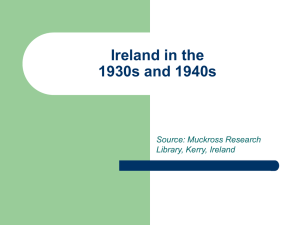
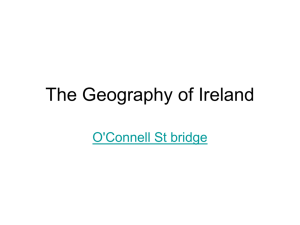
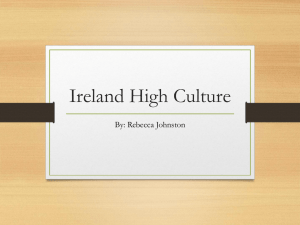


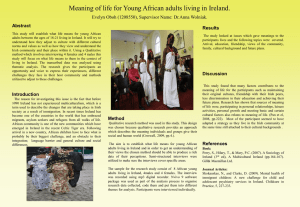
![South east presentation resources [pdf, 7.8MB]](http://s2.studylib.net/store/data/005225551_1-572ef1fc8a3b867845768d2e9683ea31-300x300.png)